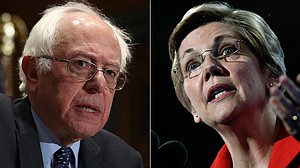2/22/2019

Before Sen. Bernie Sanders emerged as the left's alternative to Hillary Clinton in 2015, many of the same activists who eventually helped lift his primary campaign had a different progressive hero in mind: Sen. Elizabeth Warren.
At least two major efforts to draft Warren into the race folded late that spring when it became apparent the Massachusetts Democrat would sit out the race. In the aftermath, the founders of "Ready for Warren" launched "People for Bernie," a grassroots group that took off along with Sanders and is expected to be an active organizing force again in 2020.
Four years later, Warren and Sanders, who kicked off his second presidential campaign on Tuesday, begin the Democratic primary not as insurgents or slingshot-yielding giant-slayers but among the early favorites in a historically deep field of contenders vying to unseat President Donald Trump. For progressives, there is an element of the bittersweet in what's to come: two candidates they trust and credit for driving the Democratic Party's charge to the left are poised now to compete for the same votes — and, if they advance far enough in the contest, potentially divide their largely shared base of support.
"People for Bernie" co-founder Winnie Wong helped seed the group, which now features a Facebook page with nearly 1.5 million followers, by appealing to the names on an email list initially built during that 2015 effort to entice Warren.
"We decided (in 2014) that Elizabeth Warren was the best, most authentic messenger to convey to the rest of the country the message about income inequality," Wong recalled in an interview. But when it became apparent in the spring of 2015 that Warren would not run, "we decided to pivot," she said, and support Sanders.
The Vermont senator was, at that point, still a relative unknown in mainstream American politics. But where most pundits and many reporters saw a dead end, progressive activists with an eye on his ability to go viral recognized an unprecedented opportunity.
"Here we had a man who we knew had almost no name recognition and who openly identified as an independent socialist, who had given numerous speeches on the floor that, to the left, were heralded as acts of great political bravery," Wong said. "So for us on the left, he was really regarded as a real icon. And he still is."
The desire of so many Democrats to finally elect the first woman president, along with differences in age (Warren is 69; Sanders is 77), could ultimately help decide how the progressive vote breaks. But there are also deeply rooted and sincere ideological tensions that separate the friendly Senate colleagues.
Sanders, a democratic socialist, and Warren, a capitalist to her "bones," both describe the American economy and political system as "rigged" to benefit rich corporate interests. But they have diverging views on the roots of the problem and the depths of reform needed to break its grip.
Warren believes government-enforced restrictions, like those outlined in her "Accountable Capitalism Act," could unwind a decades-long trend of consolidation at what she describes as the "tippy top" of the economic ladder. Sanders argues that the rot goes much deeper and that a fundamental reordering of the economy -- most purely viewed in his long crusade for single-payer health care, which would cut the private sector out of one of America's largest industries -- is required to empower a "political revolution."
